Sierra College will have a new theatre production under its belt this fall 2024 with a performance of Romeo and Juliet, playing now through November third in the Dietrich theatre on the Rocklin campus. The play is directed by Scott Adams who has directed more than a dozen shows throughout his ten years as a Sierra College professor.
Wanting to get a little more of a behind the scenes look, I interviewed Scott Adams, and actors Cedar Swagerty who plays Romeo as well as Braden Delgado who plays Tybalt. They shared insights on what goes on with rehearsals and the casting process to all the things that happen backstage.
Over the years, Sierra College has produced many amazing plays such as Dr. Jekkell and Mr. Hyde and Guys and Dolls, so my first question to Adams was how exactly does he decide on what plays to do? Adams smiled and said, “Well, everything we do is for our students, it’s educational theatre.”
He continued, “We try to find a lot of varied styles of theatre, from modern to more recent shows to contemporary, comedies, dramas and a lot of the shows that will give our students the opportunities to grow.”
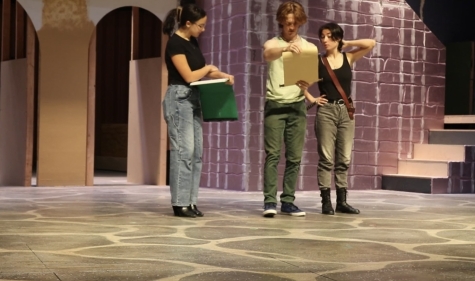
Adams went on to say how a lot of the shows are chosen based on the opportunities that it will give to the technicians as well.
As a director, he works hard to support all the communication and collaboration required for each production to run smoothly. Adams shook his head and said, “The communication process never stops! I get the costume designers coming to me saying, ‘I was thinking of something along the lines of these designs for the costumes. What do you think?’”
Taking on Roles
Cedar Swagerty, a business Major at Sierra College, plays “Romeo” this semester in his first ever theatre production on campus. He was able to talk to me about how he felt when he got the role for Romeo and even about how the audition process went. Swagerty said, “I was excited when I got the news that I will be playing Romeo, and the audition process wasn’t too bad. I went in and got to read with Juliet who had already been cast at this point. It was great to get back into theatre and play a character and just have fun.”
Braden Delgado, who is a theatre major at Sierra, is playing Tybalt this semester in his second show at Sierra College. He was also able to talk to me about how his audition process went, the challenge behind learning Shakespearean language, as well as the process behind the costumes and makeup for the actors. Delgado said, “The audition process was definitely interesting, it was very nerve racking as well.” He continued:
“A big challenge was learning the Shakespearean language, but it was also very interesting being able to do deeper research on the play and learning the context behind some of the lines.”
Delgado explained that audition process took time. He said, “They had everyone reading monologues and the entire audition process lasted three days.” On casting he said, “I was able to do some line reading as Romeo and then some as Tybalt as they constantly swapped us out with other auditionees so that they could get a feel of chemistry between the actors.”
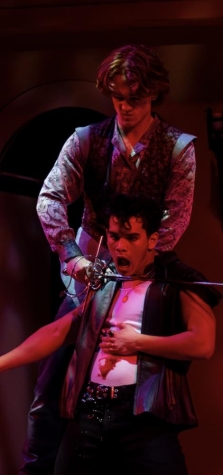
I was curious to learn more about who does the actors’ makeup and costumes so I asked Delagado about this. He said, “I am lucky to have Kyra Obanil who plays Juliet help me with applying my makeup.”
On what to wear, Delgado said, “Usually we ask our costume director what they would like to see or what’s okay or not okay for certain scenes.”
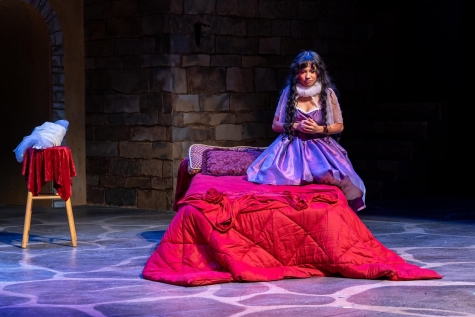
He explained that most of the costumes are made by heavily modifying already existing clothing. He said, “We have a great costume designer who is always stitching and working hard on getting the costumes just right.”
Delgado continued, “All the fabric has to be chosen and all the actors have to be measured throughout rehearsal so that our costume designers can find and modify any pieces so that we can look great on stage.” The only costume that was made from scratch Delgado told me was Juliet’s.
Swagerty, Delgado, and Adams went on to tell me how the rehearsal days are broken up with some focused on learning Shakespeare, to days where they learn fight and dance choreography for certain scenes.
The first couple of days of rehearsal started with a table read. A table read is a reading of the entire play with all actors present so that the director can hear all the actors voices, and the actors can get comfortable with one another as well as the characters they will be playing. Delgado explained, “It was really there to help us get more familiar with what was happening within the scenes. I remember messing up quite a bit, but it’s all part of the process.”
Keeping Theatre Alive in an Digital World
With the rise of streaming services such as Netflix and HBO some say people have gotten too comfortable at home. I asked Adams and Swagerty why people still continue to go see shows in the theatre when they have access to movies and television at home.
In Adams view, the fact that it’s live and different every night is a draw. He said: “With live entertainment you are there with the performers in front of you. It’s always different night to night… It’s not like that when you are sitting at home and you can cut and edit that’s not the real world. Live theatre is something that’s just so exciting and I believe that audiences love seeing the mistakes from the actors. ‘The show must go on’ type of thing. Trained actors are able to continue so it’s the reactions to the mistakes and the recoveries that really make live theatre interesting.”
Asking Swagerty the same question, he was able to give insight from his experience of live theatre compared to film. He said, “It’s interesting because with theatre, you get to play the whole entire arc of a character from beginning to end whereas with film or television it tends to get jumbled up from editing and the ways that shows are broken up. I think another great piece of theatre is as an actor you get the response of the audience as you are acting on stage. Where with film you don’t get to have that kind of live feedback.”
After learning a bit about how the shows at Sierra College are directed and performed, Adams hopes that people will recognize that theatre is far from dead.
It’s very much alive by the actors, costume and set designers, and everyone else who works their crafts behind the curtain to make the magic of theatre happen. Each night of Romeo and Juliet will be unique. Audiences should see the show to be entertained and to support the amazing work of the many who make the production.
Reported and Written by Lydia Creed
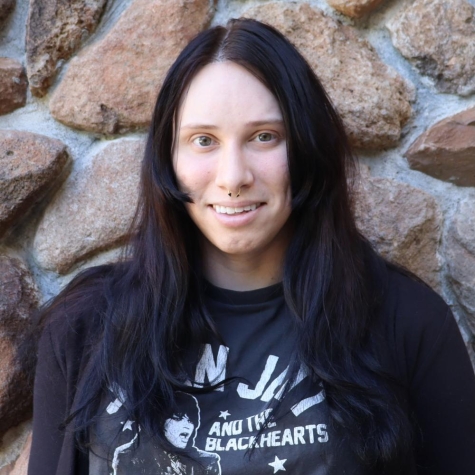
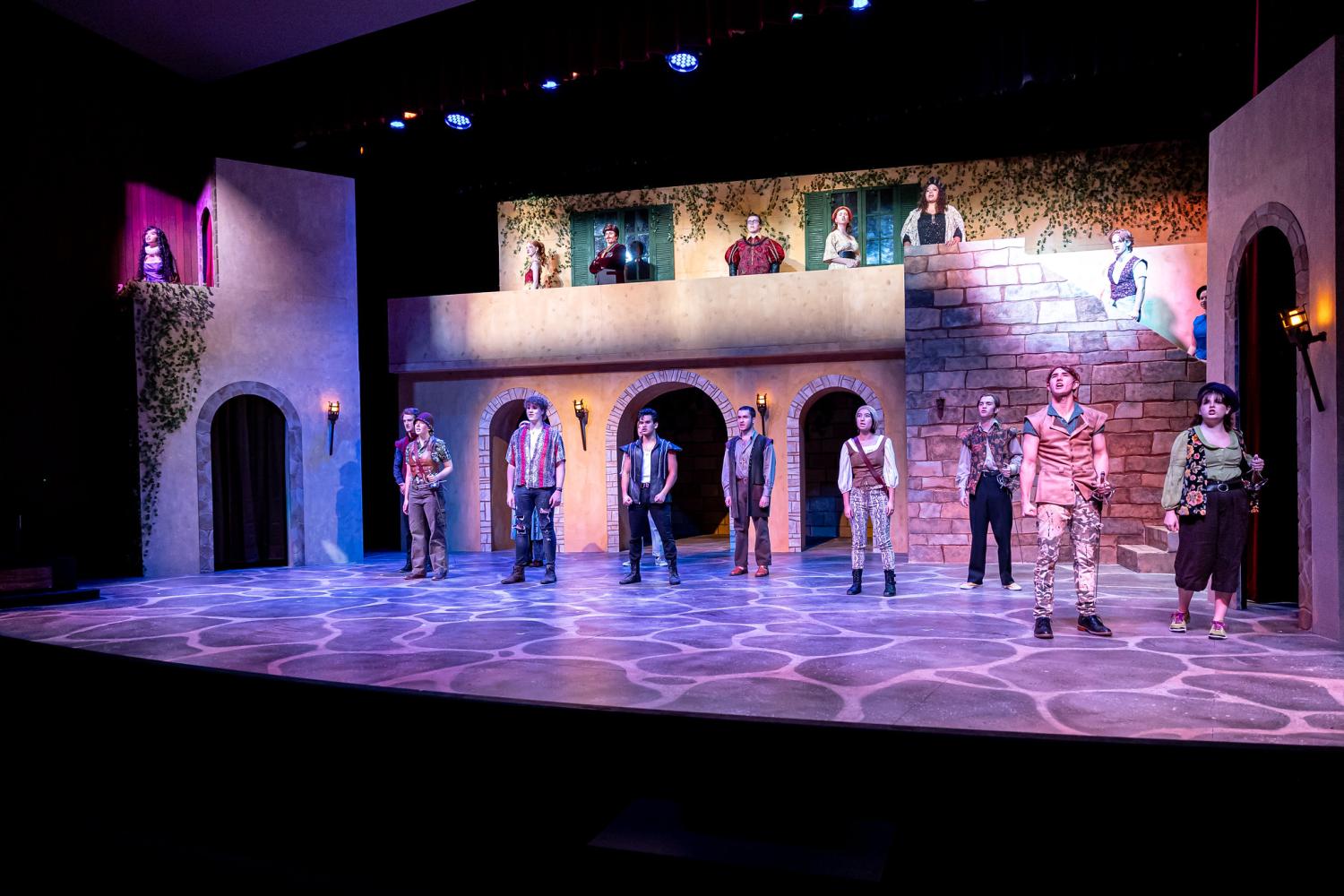
Love this write up! Well done, Lydia!! Love ya niece!